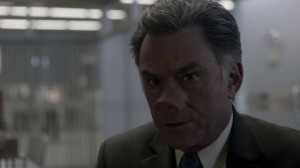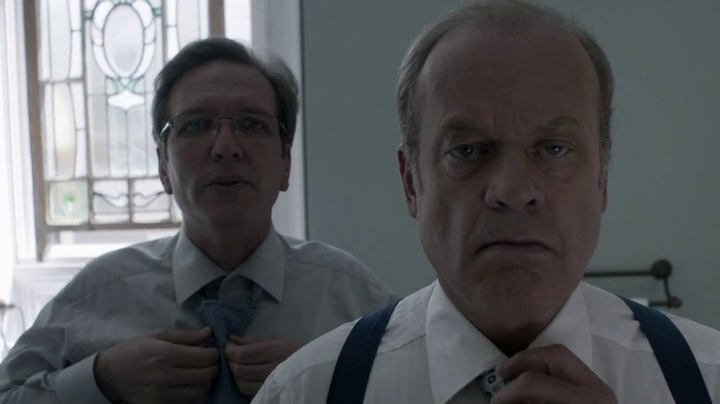Boss Season 2, Episode 5: “Mania”
Written by Kevin J. Hynes
Directed by Jean de Segonzac
Airs Fridays at 9pm (ET) on Starz
As “Mania” shows us this week, it’s when Boss strips its cast and plotlines down to an essential few that it truly gains momentum. The preceding episodes had a tough job to do: establish new characters and their motivations, and new plotlines, while also building convincingly towards Kane’s increasing madness. The general impression was that much of the work those episodes did was just that: work. Just as one example, the scenes that established Kitty’s part in the narrative this season were overwhelmingly functional and without substance and, because of that, felt largely inauthentic.
 So in “Mania”, the audience and creators get to reap the rewards of all that piecemeal plotting. The gubernatorial mid-election debate between Zajac and Walsh offers the opportunity for a few things to come together – Kitty’s revenge on Zajac; Zajac left, essentially, for dead in the race; Maggie’s failure to get what she wanted and – with nothing left to lose by separating from her husband – leaving Zajac hopeless and alone; the Sam Miller/Kitty relationship.
So in “Mania”, the audience and creators get to reap the rewards of all that piecemeal plotting. The gubernatorial mid-election debate between Zajac and Walsh offers the opportunity for a few things to come together – Kitty’s revenge on Zajac; Zajac left, essentially, for dead in the race; Maggie’s failure to get what she wanted and – with nothing left to lose by separating from her husband – leaving Zajac hopeless and alone; the Sam Miller/Kitty relationship.
For once, Boss is fairly uncluttered – save for the Emma/Darius thread, which plays no direct role in the unfolding of this particular episode (surely there’s a more cohesive way to integrate this story into the main one?). However, that “Mania” succeeds is not due entirely to this lack of clutter. Another reason is Kane’s behaviour, which reaches new, fantastic levels of unpredictability and recklessness. Grammer plays the loopier Kane with an authentic childishness, “calling it like he sees it” in a scene between Kane, Mona, and a besnouted Judge Scanlon. Dementia is always tragic, of course, but without the levity that such scenes provide, the bleakness of Boss would be unbearable and unbelievable by now.
It’s a joy to see Kane mutate, or regress, into such an idealist – an increasingly naive one at that – in an environment that has developed an effective immune system to reject such a thing. The backlash steadily builds, of course, and Mona and Ian are the first to notice that Kane is actually unhinged at times.
It appears as if Boss is committed to pursuing Kane’s inner-life and inner-conflict without taking the easy path of inflating this conflict into a tiresome good vs evil tale. The morality of Boss is not as fuzzy as that of The Wire, but – at this season’s midpoint – the question as to whether Kane’s “good” behaviour is simply a kind of childish regresssion or derives from a genuine sense of altruisim remains unresolved. Brilliantly, Boss has it both ways: a good deed is a good deed, its source ultimately irrelevant, and it’s a form of insanity. Moreover, whichever way Kane turns, good or bad, he makes enemies, some of whom are willing to kill to make their point. A fictional moral universe in which further consequences of one’s actions are not inherent in the moral quality of those actions is a convincing and open one.
Odysseas Constantinou


